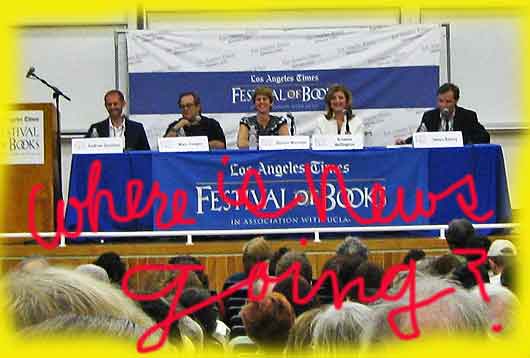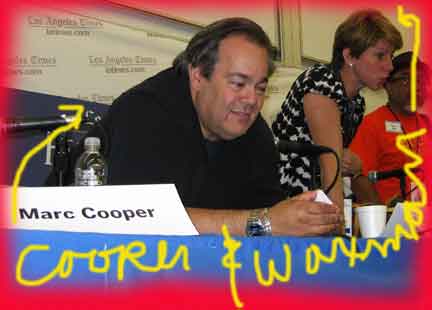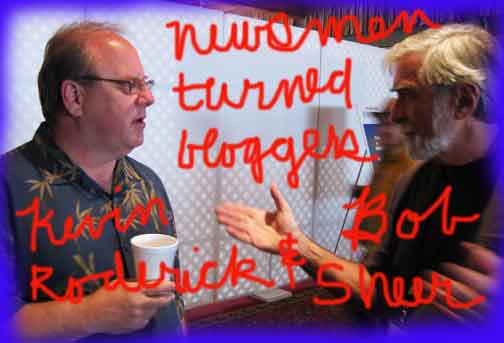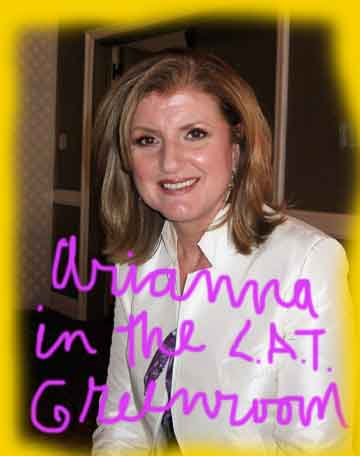
In the middle of the panel called MEDIA: WHERE DO WE GO FROM HERE at Sunday’s LA Times Festival of Books, Marc Cooper made news—or at least mini-news—when he remarked in passing that the Sacramento Bee feels it does not have the staff to adequately cover the upcoming race for governor—at least the So Cal part of the race—so they are looking to partner with the Annenberg School of Journalism in the hope that they can use student reporters can fill in the gap.
Now keep in mind that the Bee has the largest number of reporters covering the state capitol of any California media outlet. So if they’re in trouble covering an issue of state government….even the So Cal part…. this is a sign that spoke loudly to the subject of the panel.
As yet, Marc said, no deals have been struck.
(NOTE TO SAC’TO BEE: as you are a (theoretically) a profit making enterprise, you have to pay any students whom you use. You know that, right?)
************************************************************************************************************

THAT SAME FUTURE OF MEDIA PANEL was one of the festival’s big, sell-out events, with just as many people outside the auditorium, waiting in line in the hope of getting a seat, as those who were already seated.
The panel featured the aforementioned Marc Cooper, Arianna Huffington, Sharon Waxman (of the excellent new site covering entertainment news The Wrap), and Andrew Donohue, editor of the Voice of San Diego (the online newspaper that many see as one of the crucial new biz models). James Rainey, the LA Times media columnist was the moderator.
Before the panel started, the crowd was admonished that there could be “no recording” in the auditorium.
A bit later, Arianna remarked dryly that, at a panel about the future of media, “asking people not to record the session is absurd.” At this the crowd applauded vigorously.
***************************
During the hour plus (the panel ran overtime), much was said on the subject of monitization—which is inevitably the BIG TOPIC for every one of these panels. Among some of the better remarks were the following:
Arianna said, in her deadpan Greek drawl, that the only sure fire content that people are willing to pay for is porn. “People are willing to pay for weird porn,” she said. The crowd laughed.
Cooper followed with, “This is the first time in history when the right to publish is not in the abstract. Anyone can do it.” But we’re not going to know the business model for a while…..The old system is dead. The new system has yet to be invented.” He likened the present cultural moment to three or four decades after Johannes Gutenberg introduced his little invention.
Huffington: It’s time that newspaper editors admit that we cannot go back to the old model when content is behind a wall. If that’s where they go, they are going to fail. Consumer habits have changed.
Rainey: “I kind of liked the old world when Walter Cronkite was involved…. and when we were behind that wall.” He was kidding. Sort of.
*********************
Rainey also asked the other question that is always, always, always front and center during these FOM (Future of Media) discussions, namely: Where is all the great investigative work going to come from?

Cooper, Huffington and Waxman each leaned quickly toward their mics to say that great reporting isn’t going away, and that, in any case, it is produced by individuals not institutions, and that while great work came out of conventional media—there was also a lot of mediocre work too, and many many stories that were missed, and that new media has moved into that gap.
Waxman: “Only when you work for the New York Times, do you understand how much a part of the establishment that the New York Times is.” (Waxman used to work for the NY Times.)
Huffington: “Where were the mainstream journalists covering the whole Wall Street mess? They completely missed that story. And they’re still missing it.”
Cooper: Some of the reporting may come from non-journalists “who are not stupid, by the way. You don’t have to go to journalism school to be a journalist. I didn’t go to journalism school,” he added—which was another big applause line.

********
When asked to list the publications she looked at each morning, Sharon Waxman listed all the electronic outlets and news feeds she peruses, then she said, “And I do look at…..” and she paused for thought. Rainey jumped in. “The LA Times?”
Right, said Waxman, as the audience laughed, “the LA Times.”
“Don’t make me beg here,” said Rainey.
*************
At some point a woman from the audience asked what would happen to longform journalism—what with everyone’s diminishing attention span and all. Was it as good as dead? The panel seemed stymied.
Then Andrew Donohue, who had said little during the hour, spoke up. Well, he said, actually, people will read long narrative or investigative pieces, particularly when they are run as a series. “We regularly run 10,000 word series….and our readership goes up when we do.” The key is, Donohue said, they have to be good, not boring.
(Yep. That’s the key alright—a point with which I repeatedly hector my Lit Journalism students.)
*****************
In the “greenroom,” where all the authors, panelists, and miscellaneous LA literary types hang out during the two day festival, there was much talk and gossip about the same topics as those discussed by the panel—plus the other big subject: the future of publishing.
On that count, literary agent Betsy Amster said she’s a new convert to the Sony Reader, Sony’s answer to the Kindle. “I love it. It makes me feel like reading’s suddenly fun again, like it was when I was a kid,” she said.
Bonnie Nadell (agent to the late and still missed David Foster Wallace, among others) said, as she cruised through the buffet line to grab some fresh vegetables, that people still want to read as much as they ever did. “I don’t see the demand for books going away at all,” she said. I told her about Amster’s new Sony Reader infatuation. She nodded sagely and said that manuscripts are now sent to her and other agents for the Kindle and the Sony reader, and it’s actually pretty great.
The 130,000 plus people who swarmed happily around the UCLA campus all day Saturday and Sunday, purely for the love of reading, seemed to agree: Books are not going away. Not even a little bit.
*************
PS: THE TWO PANELS THAT EVERYONE BUZZED ABOUT—just because they were so damned funny—-were those that featured my pal Tod Goldberg—plus some other very witty people like, novelist Seth Greenland, cartoonist, Lalo Alcaraz, and the Daily Show’s Larry Wilmore.
And listen: I’m not saying this because Tod’s my friend, I’m telling you the unvarnished truth.
See you there next year.

If we are talking about the future of media, Arianna Huffington has my vote as the only one in the room who seems to have a clue as where it is going.
Here recording comment was spot on and her comments about the MSM/NYT reporters and the financial mess are right on also. They are still not getting the problem.
Her article about the flawed Obama economic teams thinking says it all for me:
It addition, I notice that her website tries to sell me products I have been researching, which is smart/technology based monetization.
(From Pokey) A.Huff: all the good intentions in the world
Since when did liberals recognize that it’s results rather than good intentions that count? She probably got that from Rush Limbaugh.
– – –
Here’s a scorecard on newspaper decline: E&P – Top 25 Papers by Daily Circ
– – –
Celeste, remind Marc about his near death experience with his heart and tell him that he shouldn’t be putting back on his lost weight – unless the picture is distorted.